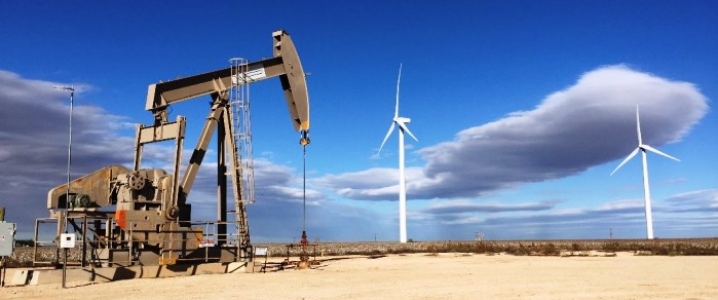Brent is nearing $80 per barrel and some analyst see $100 not far off. That raises the question about how much of a dent high oil prices will make in the U.S. economy.
$100 oil is not as painful as it once was. There are a few reasons for that. The U.S. is now a significant oil exporter, helping to lessen the damage to its trade balance. Also, the economy uses less energy per unit of GDP than it used to, becoming slightly more efficient with each passing year.
In the past, high oil prices dragged down the U.S. economy, acting as a tax that redistributed wealth from the U.S. to oil-exporting countries in the Middle East, for example. But, the shale revolution has allowed the U.S. to become one of the largest oil producers in the world, and more recently, an exporter of more than 2 million barrels per day (depending on the week). Now, to a large extent, higher oil prices redistribute wealth within the U.S., still damaging the vast majority of motorists, but benefitting a variety of industries related to the oil industry.
That has narrowed the impact on the country’s trade deficit. For example, in 2005, when oil prices bounced around in the $60s per barrel, the U.S. petroleum trade deficit hit $230 billion. In 2017, when WTI was in a similar price range, the U.S. petroleum trade deficit was just $62 billion.
According to Bloomberg Economics, $100 oil would knock off 0.4 percent from U.S. GDP in 2020 compared to if oil traded at just $75 – not trivial by any means, but not devastating either. “The price of a barrel will have to go much higher before global growth slips on an oil slick,” economists Jamie Murray, Ziad Daoud, Carl Riccadonna and Tom Orlik said.
Related: OPEC: The Oil Glut Is Gone
A survey of economists by CNBC found a mixed picture with some responding that higher oil prices are largely “a wash” for U.S. economic growth. It is a notable shift in tone and substance from the past, when higher oil prices as an economic headwind was taken as a given. "We think the effect will round to a wash,'' Michael Feroli, chief U.S. economist with J.P. Morgan Chase, told CNBC. He noted that higher oil prices would reduce GDP by 0.2 percent, but that would be offset by an increase of 0.2 percent in capital spending.
That conclusion was echoed by St. Louis Federal Reserve President James Bullard who agreed that higher oil prices spark more activity in the energy sector, offsetting some of the losses elsewhere. "This will also encourage U.S. production, and compared to years past, oil prices have a more neutral effect on the U.S. economy,'' Bullard said. "It used to be a big oil shock was probably bad news, … but now I think it's neutral."
Still, the marginal impact is only true up to a certain point. Drivers can stomach $3-per-gallon gasoline, but $4 per gallon is another matter. Also, the benefits accruing to the energy sector and related industries are concentrated, while the economic drag on consumers is widespread. If retail gasoline prices average $2.96 per gallon this year, it will wipe out a third of additional take home pay from the 2017 tax cuts, according to Morgan Stanley. Related: Expert Analysis: What’s Next For Russian Oil
Moreover, to the extent that higher oil prices stokes inflation, it could spur more aggressive action from the U.S. Federal Reserve. More rate hikes would drag down the economy, making the cost of borrowing more expensive. It would also strengthen the U.S. dollar, hurting export industries.
Citi economists warned that if oil prices rise even further, there could be a “particularly hostile environment” for global investors in the coming months. The investment bank said that President Trump’s decision to withdraw from the Iran nuclear deal “constitutes a major geopolitical shift,” that could bring on “stagflation,” consisting of weak economic growth and higher inflation, spurred on by higher oil prices.
For now, Brent is struggling to break $80 per barrel. There are plenty of reasons why prices could continue to rise, but $100 per barrel is still a long way off.
By Nick Cunningham of Oilprice.com
More Top Reads From Oilprice.com:
- Iran Sanctions Threaten The Petrodollar
- Could This Be The Next Proxy War In The Middle East?
- The Top Performing Stock Of The U.S. Shale Boom


















